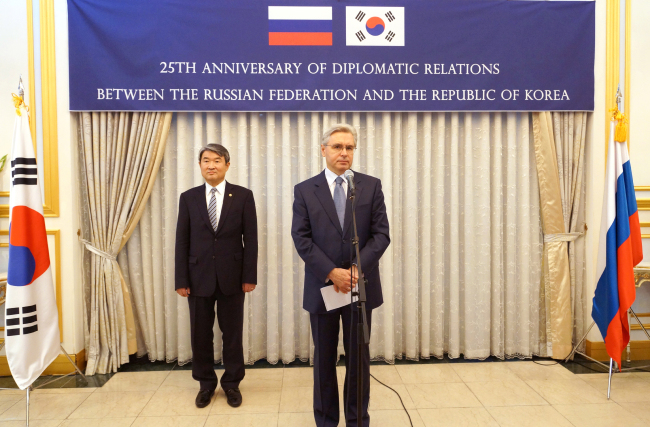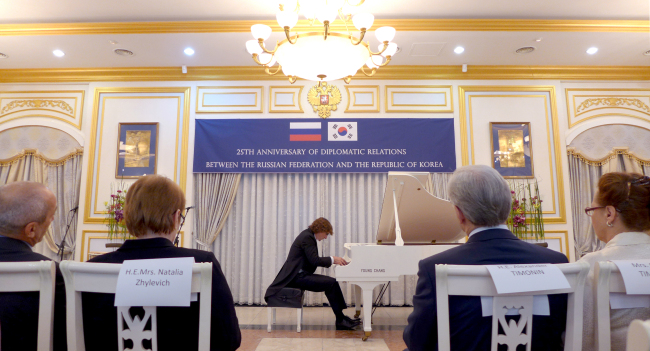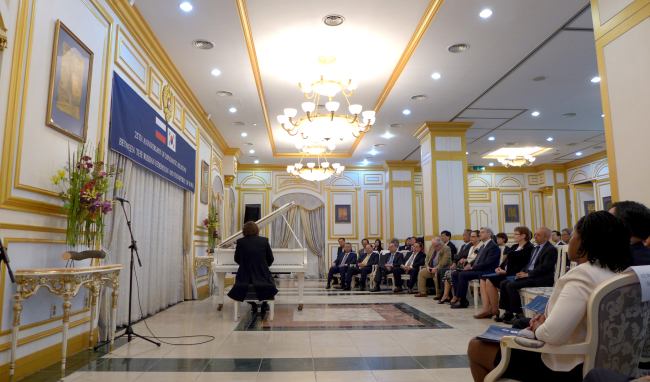Russia and Korea last week celebrated 25 years of diplomatic relations that have moved beyond ideological differences to shared interests in the region and the world.
Moscow and Seoul are now close partners in an evolving multipolar international order, drawing on their respective leverage in East Asia and Europe.
Since establishing diplomatic ties in 1990, over 50 interstate and intergovernmental agreements were concluded, 27 official summits were held and bilateral trade volume has reached $26 billion last year.
Moscow and Seoul are now close partners in an evolving multipolar international order, drawing on their respective leverage in East Asia and Europe.
Since establishing diplomatic ties in 1990, over 50 interstate and intergovernmental agreements were concluded, 27 official summits were held and bilateral trade volume has reached $26 billion last year.

“Today, we are proud to declare that there is practically no area in which we do not interact, be it international security, trade, economy, energy, science and technology or humanities,” Russian Ambassador Alexander Timonin said in a speech at a reception at the Russian Embassy on Thursday.
“Our mutually beneficial cooperation fully corresponds with the basic interests of our citizens, and provides for strengthening peace and stability on the Korean Peninsula and in Northeast Asia,” he said.
According to Timonin, a vital component of the bilateral relationship rests in securing regional peace and stability through Pyongyang’s denuclearization, by faithfully applying the joint statement from the six party talks in September 2005, which sought to dismantle the North’s nuclear program.
A career diplomat for over 35 years, Timonin, 63, has developed expertise in regional security and multilateral economic cooperation with a focus on Korea and Northeast Asia, according to the embassy. He participated in the six-party talks as a deputy head of the Russian delegation from 2004-06, and authored several books and articles on the related matters.
He was an ambassador to North Korea prior to his post here, which began at the beginning of this year. He also served as a minister-counselor in Seoul from 2000-04 and 2006-11.
“I would like to also note,” he said, “that Russia always stands for the normalization of inter-Korean relations, and supports by practical steps the aspirations of the two Korean states for a peaceful unification.”
Recent high-level exchanges involved Russia’s chairman of the State Duma, Sergey Naryshkin, who visited Korea in May, Russia’s Security Council Secretary Nikolai Patrushev, who came to Korea in September, and Korea’s National Assembly Speaker Chung Ui-hwa, who is currently touring Russia.
Noting the efforts to push forward large-scale economic projects in Russia’s resource-rich Far East that would involve Russia, North Korea and South Korea, Timonin stressed that South Korean investors would receive “favorable conditions” for participation.
Russia, China, Mongolia and South Korea have been working together through an intergovernmental cooperation mechanism called the “Greater Tumen Initiative,” launched in 1992 under the United Nations Development Program.
The initiative aims to transform the Tumen River Area bordering Russia, China and North Korea into a regional hub of sustainable development, encompassing trade and investment, energy, tourism, transport and environmental conservation. The region has rich reserves of oil, gas, coal and metal as well as timber and marine life.
The two Koreas and Russia have also been collaborating on the Rajin-Khasan project, designed to turn North Korea’s northeastern city of Rajin into a logistics hub and link it with Russia’s nearby township of Khasan through the Trans-Siberian Railway.
At the Asia-Europe Meeting Symposium in Seoul in early September, Korean President Park Geun-hye encouraged cooperation among Russia, the U.S., China and South Korea to develop a transport and logistics network linking Europe and Asia, in a bid to reinforce Korea’s foreign policy centerpiece the “Eurasia Initiative.”
In a speech at the reception, Korea’s First Vice Foreign Minister Cho Tae-yong emphasized that Korea’s Eurasia Initiative and Russia’s Far East and Siberian development plans would create synergy, bolstering Eurasia’s shared prosperity.
“Thanks to the Eurasia Express, Korean people have become more interested in the Eurasia Initiative, feeling much closer to Russia,” Cho said, referring to the 20-day, 14,400-kilometer intercontinental railway journey from Vladivostok and Beijing to Berlin in July, joined by 150 participants.
The minister also touched on Korea’s supranational diplomacy plan, the Northeast Asia Peace and Cooperation Initiative, expressing Seoul’s willingness to partner Russia in solving nuclear safety, environment, health and disaster relief challenges.
“We hope that Russia continues to play a constructive role in fostering peace and stability on the Korean Peninsula and contributing to our peaceful unification,” Cho added.

In a separate event on Sept. 24, the Russian Embassy held a concert to mark the 25th diplomatic anniversary, titled, “Russian muses to the world.” The project performed in Moscow, Berlin, Rome, Paris, London, Geneva and Amsterdam before coming to Seoul.
The event featured Russian pianist Sergey Tarasov, a laureate of a dozen international competitions and professor at Keimyung University, and Korean bass singer Lee Yeon-seong. Tarasov played compositions by Bach, Schubert and Rachmaninov, after which Lee sung the Korean song “River Han” and the Russian song “Stenka Razine.”
“Russia is the homeland of Dostoevsky, Shostakovich, Richter, Solzhenitsyn and their successors,” the project president Boris Rubin told the crowd. “Scientific and technical accomplishments of a nation grant to it respect and admiration, but the works of art make people fall in love.”
By Joel Lee (joel@heraldcorp.com)

-
Articles by Korea Herald





![[KH Explains] No more 'Michael' at Kakao Games](http://res.heraldm.com/phpwas/restmb_idxmake.php?idx=644&simg=/content/image/2024/04/28/20240428050183_0.jpg&u=20240428180321)




![[Grace Kao] Hybe vs. Ador: Inspiration, imitation and plagiarism](http://res.heraldm.com/phpwas/restmb_idxmake.php?idx=644&simg=/content/image/2024/04/28/20240428050220_0.jpg&u=)









